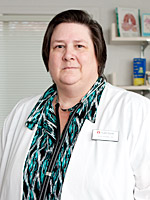SPU and the H1N1 Flu: Plans and Precautions
 The University began to address issues with the H1N1 virus (swine flu) last spring. We will continue our communication with regular updates to our website and to parents and guardians that will reflect the most current information available.
The University began to address issues with the H1N1 virus (swine flu) last spring. We will continue our communication with regular updates to our website and to parents and guardians that will reflect the most current information available.
Prevention Is Key
As is the case with many health-related issues, prevention is a key factor — especially with H1N1. Here are a few suggestions:
- Good Hand Hygiene. Wash hands thoroughly and often with soap and water. Supplement hand washing with alcohol-based hand cleaners.
- Respiratory Etiquette. Covering one’s mouth and nose when coughing or sneezing reduces the spread of germs and the virus. Use a tissue (only once) or the crook of an elbow — not your hands. Avoid touching the eyes, nose, and mouth; germs are easily spread this way.
- Signs and Symptoms. SPU’s Health Services provides helpful information regarding the signs and symptoms of the flu. Health Services staff members are available for diagnosis of and treatment for serious illness.
- Self-isolate if Ill. The Center for Disease Control (CDC) suggests that students with flu-like illness limit their interactions with others, except to seek medical attention.
Institutional Preparations
SPU is making other preparations for students affected by H1N1.
- Faculty education. Faculty members are receiving education on the H1N1 virus and how it may affect the classroom. Les Steele, vice president of Academic Affairs, will send an email to all faculty regarding symptoms of H1N1, student absenteeism, and alternative educational delivery options.
- On-campus housing plans. The Residence Life and Housing departments are preparing for students living on campus who may contract flu-like illness. Identifying and checking in with students who may be ill are important.
- Those who have flu-like symptoms will be encouraged to self-isolate until they are free from a fever for 24 hours without the use of medication.
- If you have a student living on campus who becomes ill, please ask your student to contact a residence hall staff member, such as a peer advisor (PA) or residence life coordinator (RLC).
- Meal service options. University Services is working with our dining service provider, Sodexho, to provide “flu trays” for students with flu-like illness and who have a valid meal plan.
- Have your student check with a residence hall staff member (PA or RLC) or dining services personnel for assistance.
- For students without meal plans, flu trays will be available at the on-campus convenience store (C-store) for purchase.
- Increased sanitization. Sodexho, our dining service provider, has taken measures to reduce the spread of germs by providing hand sanitizers in the dining commons and touch-surface sanitizing to help prevent the spread of the flu. SPU’s facilities staff will continue to be diligent in cleaning and providing products for the health of our community.
- More than 70 hand-sanitizing dispensers have been placed in common areas around campus.
- Restroom soap dispensers are filled with anti-bacterial soap.
- Campus offices have alcohol-based hand solutions in reception areas.
- Public areas will continue to receive attention for cleaning to prevent the spread of germs.
Partner With Us
Although you are not present on campus, we ask that you partner with us to keep your student healthy.
- Flu kits. Make sure your student comes to campus with a flu kit.
Contents for a flu kit (PDF) are available on the Health Services’ website. - Self isolation. If your student contracts flu-like symptoms and lives close to campus, consider bringing your student home for a short period of time. The CDC suggests that students self-isolate for 24 hours AFTER they no longer have a fever (or signs of a fever) without the use of fever-reducing medication.
- Existing medical conditions. If your student has a medical condition that puts them at an increased risk of severe illness from the flu, ask them to seek medical attention promptly.
Providing current information and recommendations are of significant importance as we address the concerns presented by the H1N1 virus.
The SPU Health Center continues to be the central source of H1N1 information for our campus community. Please visit the Health Services website for more information and links. As necessary, the SPU administration will communicate with you.
We appreciate your partnership in these efforts to keep the SPU community healthy.
Jean Brown
Director, Student Health Services
Jeff Jordan
Associate Vice President for Academic Affairs
Dean of Student Life
View Feature Story Archives


